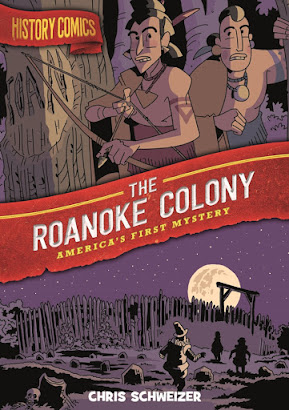First Second has been putting out some excellent non-fiction comics the past few years, and Chris Schweizer's The Roanoke Colony: America's First Mystery is no exception. You might be familiar with the basic story: there was a settlement established on Roanoke Island in the late 1500s, but when the governor sailed back to England and returned, he found the settlement was gone with only the "mysterious" word Croatoan carved into one of the trees. Where did the settlers go? What does "Croatoan" mean? Ooooo, spooky!
At least, that was the presentation I always heard. Starting from grade school history class up through... well, when I started trying to learn things on my own basically. And I learned that it was known even from back then that Croatoan was a nearby island where some tribes of Native Americans lived, and wasn't it curious that some of these younger natives now were lighter skinned, with even a few sporting blonde hair? Well, this great mystery starts to unravel itself a bit then, doesn't it?
Schweizer cleverly starts his book with that old, overly dramatic premise that this whole town just mysteriously vanished... only to subvert that a few pages in with a second narrator castigating the first for exaggerating things too much. Schweizer quickly establishes that yes, this is the story of THAT Roanoke, but there's a fair chance that the version you heard is bunk. He then backs up to talk about the Secotan tribe that lived there before the English came and started mucking things up, and covers the backstory of why the English tried settling there in the first place. By the time we catch back up to Sir Walter Raleigh discovering the abandoned village, readers already can make some of their own educated guesses on what might have happened. Schweizer then proceeds to spell out some of the theories that have come up over the years -- some decidedly more outlandish than others -- and ultimately provides what science thinks is the most logical way to fill in the gaps of what we don't conclusively know. I don't think it would spoil things to say that they're pretty sure it wasn't aliens.
If you're familiar with any of Scweizer's other work, you'll find his artistic and storytelling chops here enjoyably on par with any of his other stories. The book narratively flows very smoothly, and has light tone making it more than readable for youngsters who might not be emotionally ready for some of the more violent aspects of this portion of history. Those aren't ignored, but they're handled in a discrete manner -- I believe all the actual deaths occur off-panel. But I detected little to no white-washing; the English are clearly shown to be the assholes here, despite also being the protagonists. (You can almost taste the sarcasm Schweizer imbues in the book when he has John White proclaim, "We haven't done anything terrible this time!")
I think one of the ways Schweizer is able to pull this off is by making the narrators Manteo and Wanchese, members of the Croatan and Roanoke tribes respectively, who were actually there to witness many of the events first-hand. Readers are thus able to sympathize more readily with them, as the story is told from their perspectives. And that they're from two different tribes, they're able to provide slightly different takes on what the English do and how they might react to them. This reinforces that "Native American" covers a wide array of groups, and they don't all think and act as one. Particularly as the story progresses, they take decidedly different approaches to dealing with the English.
I'm a big proponent of correctly learning the decidedly incorrect stories I was taught in school. I've enjoyed pretty much every First Second book I've picked up, and every Chris Scweizer book I've picked up. The actual story is more interesting, in my opinion, than the legend and Schweizer is an excellent person to tell it. I think there are plenty of great reasons to pick this up.
Now Available!
Blog Archive
-
▼
2020
(296)
-
▼
August
(26)
- Long Live the King
- Weekly Recap
- Ruled by Hatred
- Find a Community!
- Comic Story Idea
- What's in a Publisher?
- August 1972 in Comics
- Weekly Recap
- Do You Cull Your Collection?
- Super Inspiration
- It's Not Me, It's You Redux
- The "Lost" Crogan Saga
- Roanoke Colony Review
- Weekly Recap
- Friday Links
- A Few Thoughts About Empyre
- Maybe an Opportunity for Indie Creators?
- Epic Life of the King Comics Review
- USPS Concerns, Part 2
- Weekly Recap
- The Corpses Of Dr. Sacotti Redux
- Mighty Crusaders Action Figures?
- (Mis-)Reading Context
- Birds of a Feather
- Links for Monday
- Weekly Recap
-
▼
August
(26)







0 comments:
Post a Comment